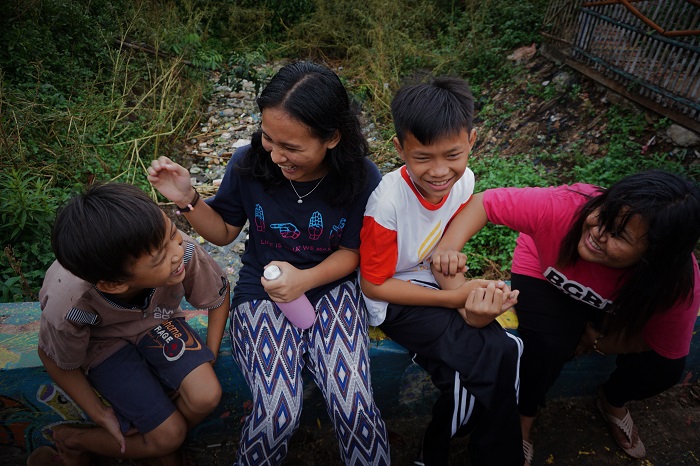On a recent study trip, journalism student Lisa Favazzo met two people giving back to their communities in extraordinary ways
Lisa Favazzo
From opposite sides of the country and some of its poorest communities, Resa Boenard and Billy Mambrasar, both 32 years old, are doing all they can to make sure that no child in Indonesia is left behind.
Resa is from Bantar Gebang, 40 kilometres west of Jakarta and home to Indonesia’s largest landfill. Eight-thousand tons of rubbish is processed here each day. Around 6000 families call it home. Gruelling days are spent picking through decaying food-scraps and glistening coloured plastic. The work is so painstaking that locals tell of the need to dose up on painkillers in dangerous quantities in order to continue. Resa’s little sister, Iin, told me the hardest part about growing up in Bantar Gebang is the way people treat you. ‘They think, “she’s just a girl from the dump”’, Iin recounted. People told her she ‘smelt bad’ and would ‘never go to university’. A lot of scavengers’ children drop out of school to work on the dump.
Billy is from the Ansus, Yapen, in Papua province. Ansus is a place of remarkable beauty and struggle. It is a region rich with gold, gas and other highly valued resources. The government and foreign developers have engaged in massive resource extraction here, dating back to the period of Indonesia’s second president, Suharto. But, Billy tells me, indigenous Papuans have not yet seen enough real investment in their people. Billy described his home province as one of the poorest and least developed parts of Indonesia. Twenty-eight per cent of its people live below the poverty line and education is considered a privilege.

Unlike most people from their communities, Billy and Resa were able to get a university education. Resa has a degree in Information Technology from the University of Gunadarma in Depok. Billy has a Bachelor of Science with a major in Engineering from the Australian National University in Canberra. Resa progressed through her education with the support of a benefactor who visited Banter Gebang as a part of zakat, the Islamic obligation for wealthy Muslims to give to the less fortunate. Billy’s academic brilliance allowed him to reach the highest levels with the aid of government scholarships. He is now a candidate in the Project Management Masters program at Oxford University. Both are strong willed and thick skinned, which has been important for their individual successes, but both also have a strong sense of their obligation to now contribute to their communities.
I travelled up 42 floors of Jakarta’s World Trade Centre to hear Resa speak at an event hosted by the professional woman’s group from the British Chamber of Commerce Indonesia. Guests enjoyed mini-quiches from pristine white plates as they waited for Resa’s presentation. The rubbish dump appeared to leak from the flat-screen televisions around the room. Standing five foot tall in front of an audience of diplomats and journalists Resa said, ‘If you send your waste to Bantar Gabang, come here and help us clean it’.

Resa had a successful career in recycling technology. By her late twenties, she ran her own consulting business and was travelling the world. Now, she has returned home to give back to her community through a project called BGBJ (Bantar Gebang Biji, or seeds of Bantar Gebang). The organisation attracts volunteers and sponsors from around the world, allowing it to provide English classes, learning activities and other forms of supplementary education to the children of scavengers in Bantar Gabang. Resa encourages the children to ‘dream big’ and make the most of their opportunities. ‘People call this place nasty, disgusting and stinky, but I say this is the best dump ever,’ she states proudly.
I met Billy Mambrasa when he was the guest speaker at an event for Oxford University alumni held in Jakarta’s affluent Mega Kuningan area. Billy wore a cap and a T-shirt. While he spoke with quick-wit and eloquence, his energy was tender. His purpose for being there: ‘I want to tell a story about the poor kids of eastern Indonesia’. In 2009, Billy was working off-shore as an engineer when he felt the pull of home; he wanted to give something back. His program, Kitong Bisa, started with just a few children at his family home. Today Billy runs 13 informal learning centres across Indonesia, operated by 152 committed volunteers. Billy told me this shows 'how committed the young Indonesian generation is to being part of change’. So far, Kitong Bisa has helped over a thousand children.
Both BGBJ and Kitong Bisa are programs designed to supplement the state education and welfare systems. Resa aims to transform the self-image of children who see themselves as somehow less worthy. ‘Just because they are from the dump, doesn’t mean they shouldn’t be educated,’ she explains. Billy wants Papuan children to learn to think critically so they are able to ‘solve the real problems facing their communities.’ He is determined that the future generations of Papuans will be active in the development of their own communities, not simply passive observers. Both Resa and Billy believe that providing the opportunity for the children to learn English is highly important, for it gives underprivileged children access to the broader world and the opportunities they may find there.
Neither see their work as charity. They are investing in the future of their communities. As Resa said, ‘children are the seeds of love, and we want them to grow into big trees.’
Lisa Favazzo (lisagrace95@gmail.com) is a journalism student from RMIT University in Melbourne. She recently returned from Indonesia where she was part of the Australian Consortium for 'In-Country' Indonesian Studies (ACICIS) journalism program.












